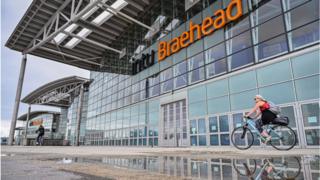Shopping centre giant Intu enters administration

Image copyright
Jeff J Mitchell
The owner of some of the UK’s biggest shopping centres, Intu, has called in administrators.
The firm, which owns the Trafford Centre, the Lakeside complex, and Braehead, said earlier it had not reached an agreement in financial restructuring talks with its lenders.
Its centres will stay open under administrators KPMG.
The company said shares listed on the London and Johannesburg stock exchanges had been suspended.
The significance of Intu’s collapse “cannot be understated,” said Richard Lim, chief executive of Retail Economics.
- Intu collapse: What went wrong for the retail giant?
The coronavirus lockdown is speeding up a trend towards buying more consumer goods online, he said. He estimates 50% of workers normally can’t receive parcels at work.
‘Too much retail space’
But with many people spending most of their time at home, and car journeys to shopping centres discouraged, many of those people are now ordering via websites.
How landlords should react is a difficult question and there won’t be a simple solution that will work for every mall, he says.
Shoppers in Nottingham said they hope the shops will remain open
Particularly hard-hit will be shops at large office developments like Canary Wharf if more people are working from home.
“It’s going to be a really, really tough challenge. There’s no getting away from the fact we have too much retail space.”
While more retailers and shopping centres are likely to close, landlords can offer shorter, flexible leases, he said, to attract retailers with new ideas.
The firm said it had appointed three administrators at the KPMG accountancy firm and that “the appointment is expected to become effective shortly”.
The company was one of the UK’s biggest shopping centre group, with 17 centres in the UK.
In Nottingham, where it owns the Victoria Centre, shoppers said they hoped stores would remain open.
One worker at the local Boots, who didn’t give her name, said she didn’t know yet whether her shop will be affected. “I think we’ll all be worried,” she told the BBC.
Intu had been struggling even before the coronavirus outbreak with about £4.6bn worth of debt.
Image copyright
Getty Images
Intu owns the Trafford Centre in Manchester
Intu has a hugely complicated corporate structure.
Although the company’s gone into administration, its shopping centres haven’t.
They are separate companies owned by a myriad of banks and lenders.
And they’ve now got the keys. Shoppers aren’t likely to notice any real difference in the short term. But buyers will be sought.
The jewel in the crown is Manchester’s Trafford Centre, followed by Lakeside.
But Intu’s less-popular malls will prove more difficult to sell, especially given the turmoil in retail right now.
Intu is a property business which basically put all its eggs in one basket, buying more malls as shopping habits changed, and it ended up with way too much debt.
Coronavirus then compounded its problems.
Intu’s spectacular collapse also highlights the pressures retail landlords are now under given the big slump in rental income from their tenants.
According to its annual report, published in March, its debts were worth 68% of its assets, a jump from 53% a year earlier.
It told investors earlier this month that it expected rent collected for 2020 to drop to £310m from £492m a year earlier.
According to Property Week, landlords collected just 18% of commercial rents for the three months to 24 June.
As rent payments dried up and property values fell, its prospects declined.
The company employs 2,500 people and its wider supply chain supports about 130,000 jobs, which will now be in doubt.
Intu’s centres were partially shut during the coronavirus lockdown, with only essential shops remaining open.
The company had about 60% of shopping centre staff and about 20% of head office employees on furlough.
Investors in the company’s shares will be nursing heavy losses.
Its shares traded as cheaply as 1.2 pence each early on Friday, valuing the company at £16m. It was worth as much as £13bn in 2006.

